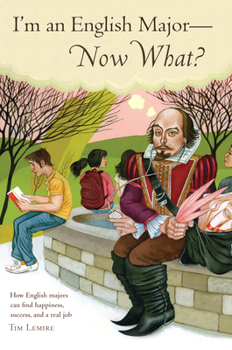I'm an English Major - Now What?: How English Majors Can Find Happiness, Success, and a Real Job
Find a Job You Love With Your English Degree What do Steven Spielberg, Alan Alda, Barbara Walters, Clarence Thomas, Diane Sawyer , and Stephen King have in common? That's right-they were English... This description may be from another edition of this product.
Format:Paperback
Language:English
ISBN:1582973628
ISBN13:9781582973623
Release Date:April 2006
Publisher:Writer's Digest Books
Length:256 Pages
Weight:0.85 lbs.
Dimensions:0.8" x 6.0" x 9.0"
Customer Reviews
5 ratings
Thank youuu
Published by Thriftbooks.com User , 15 years ago
The disconnect between my course material and job opportunities made the future seem pretty dubious. I felt like I had chosen my major on a dumb hunch and the uncertainty was torturous. It got so bad that I almost swore off English for good...until I picked up this book. We've all heard that nice piece about what a flexible major English is, but I used to think it was just a polite, comforting lie. Reading this book actually got excited me about my options. (Which are far from limited!) There are jobs out there for people who love literature, and they don't require you to masochistically forfeit a rich and satisfying life.
A Much-Needed Glimpse into the Work-a-Day Aspects of Writing
Published by Thriftbooks.com User , 18 years ago
You're an English major. So, what are you going to do with that? After all, physics majors become physicists, psychology majors become psychologists and history majors become historians. What do English majors become? Englishists? Englishologists? People usually choose to major in English because they love literature, reading and writing. When they enter the workforce they find that they also love a place to live, transportation and eating. Not to worry. Where there is linguistic communication -- speeches, presentations, commercials, ads, podcasts and broadcasts -- there is work for the English major. I'm an English Major -- Now What? offers guidance to English majors who wish to translate their skills into employment. It dispels fears about career options, answers questions about education and job opportunities and refutes misconceptions about making a living from writing. Each of Chapters Two through Eight offers a discussion of an opportunity for English majors, covering teaching, continued education (grad school, journalism school, Masters in Fine Arts), journalism, magazine publishing, book publishing, freelancing and business writing. Sidebars, glossaries, exercises and interviews add value to the information presented. Chapter Nine lumps together radio, television, marketing, advertising, technical writing, public relations, public affairs, alumni affairs, military writing and nonprofits. The sketches of these careers are disappointing compared with the information available in previous chapters. Author Tim Lemire goes on to lament the current state of English major programs (and higher education in general) and offers suggestions for improvement. He argues for a program that imparts not only theory but practical skills as well. The book concludes with five appendixes, offering some of the best material in the whole work. The discussion of job hunting and advice to aspiring writers found here is alone worth the price of the book. Lemire also lists additional books to read and Web sites to investigate.
Best-in-class reference for English majors
Published by Thriftbooks.com User , 18 years ago
Lemire's book is the best on this subject I've seen, filled with sound advice and real insight. Avoiding the generalities of many other guides, the author dives deep into each topic -- teaching, feature writing, fiction writing, speech writing, etc. -- and his observations are offset by extensive interviews that offer alternate viewpoints. Nicely organized and extremely well-written -- fluent, funny, and opinionated -- it is both easy to glance through as a reference and very substantive as a straight-through read.
All kinds of good advice for English majors
Published by Thriftbooks.com User , 18 years ago
As an English major leaving college in 1996, I had no idea what I wanted to do, or even that getting jobs that used my training in writing were within reach. I wish I'd read this book then. Lemire gives in-depth treatment to seven professions and a few hints about another 10. He profiles each discipline fairly, showing both the good and bad sides without ever sounding too rosy or too discouraging. (That's no mean feat, given that Lemire has apparently done all these jobs himself.) Maybe the most interesting parts are the interviews, where Lemire talks to English majors who have carved out careers for themselves in each of the industries. Each one is like a really valuable 10 minute phone call with the person you want to be. This book is a worthwhile read not only for those graduating with an English degree but also for those just declaring an English major, who still have time to get a head start at school. An excellent, well-written, readable resource.
The Perfect Graduation Gift
Published by Thriftbooks.com User , 18 years ago
If I had this book twenty years ago, I could have saved a lot of time and effort in navigating my career. Mr. Lemire mixes humor, practical tips, and self-enlightening exercises that gives the reader a real-life sense of how to integrate a background in English with finding a gratifying job that actually pays the bills. Simply put, this book is the Bible for transitioning from college to "corporate" life. Moreover, it's useful, easy-to-read, and chock-full of wisdom. This book should be mandatory reading for all college graduates.





